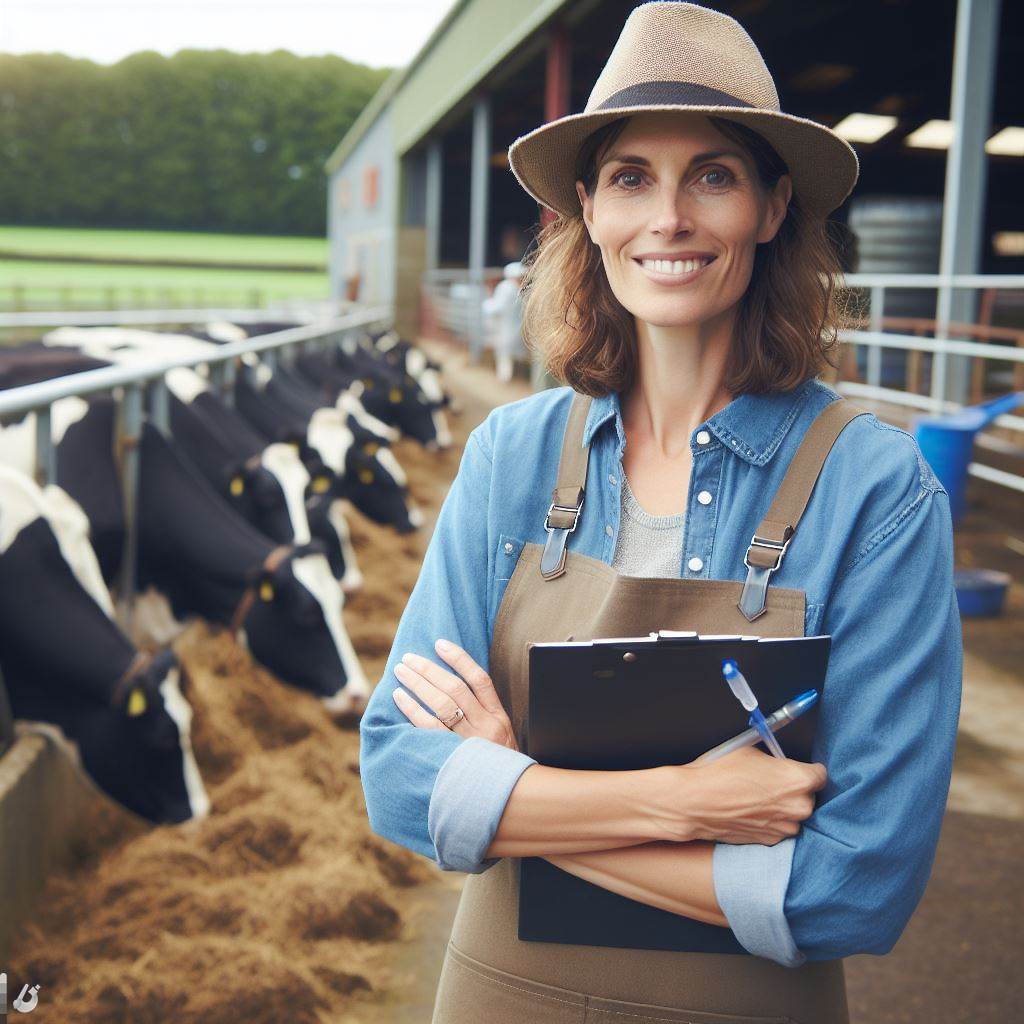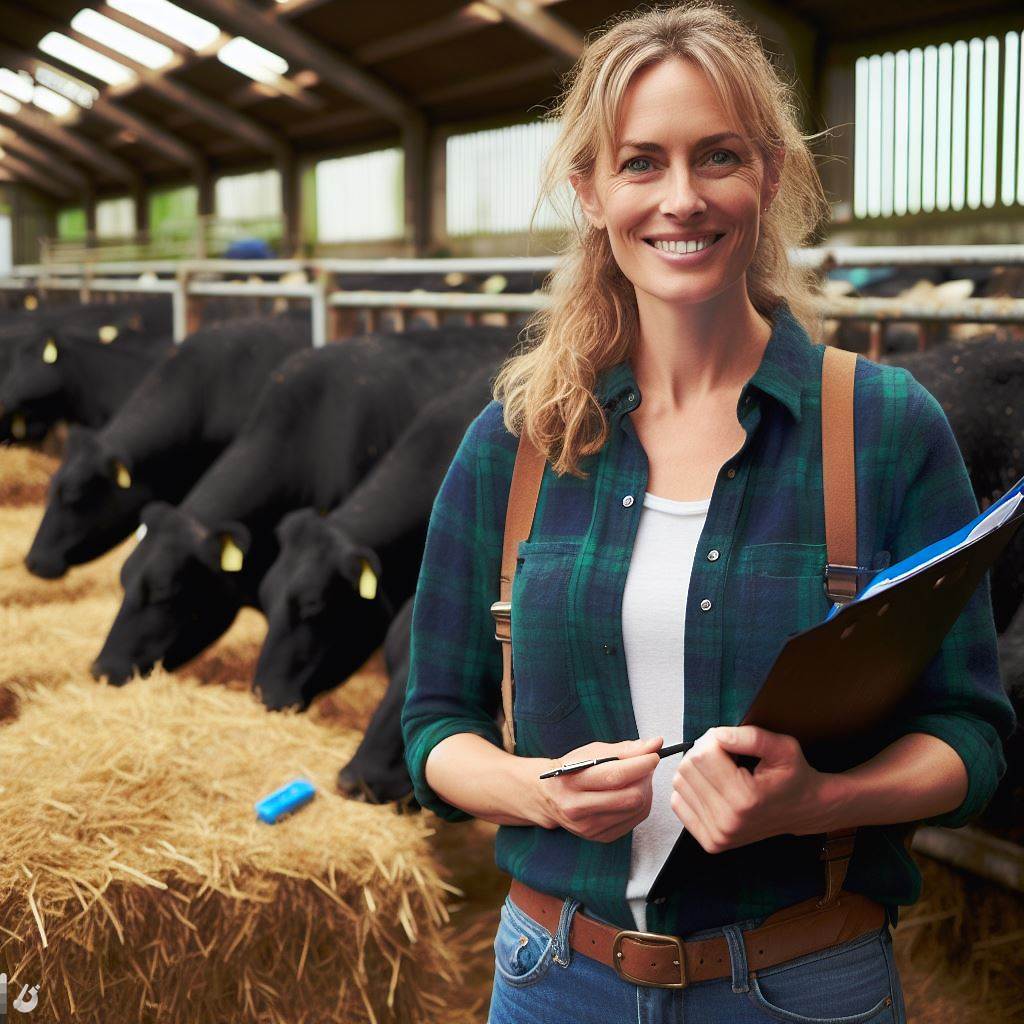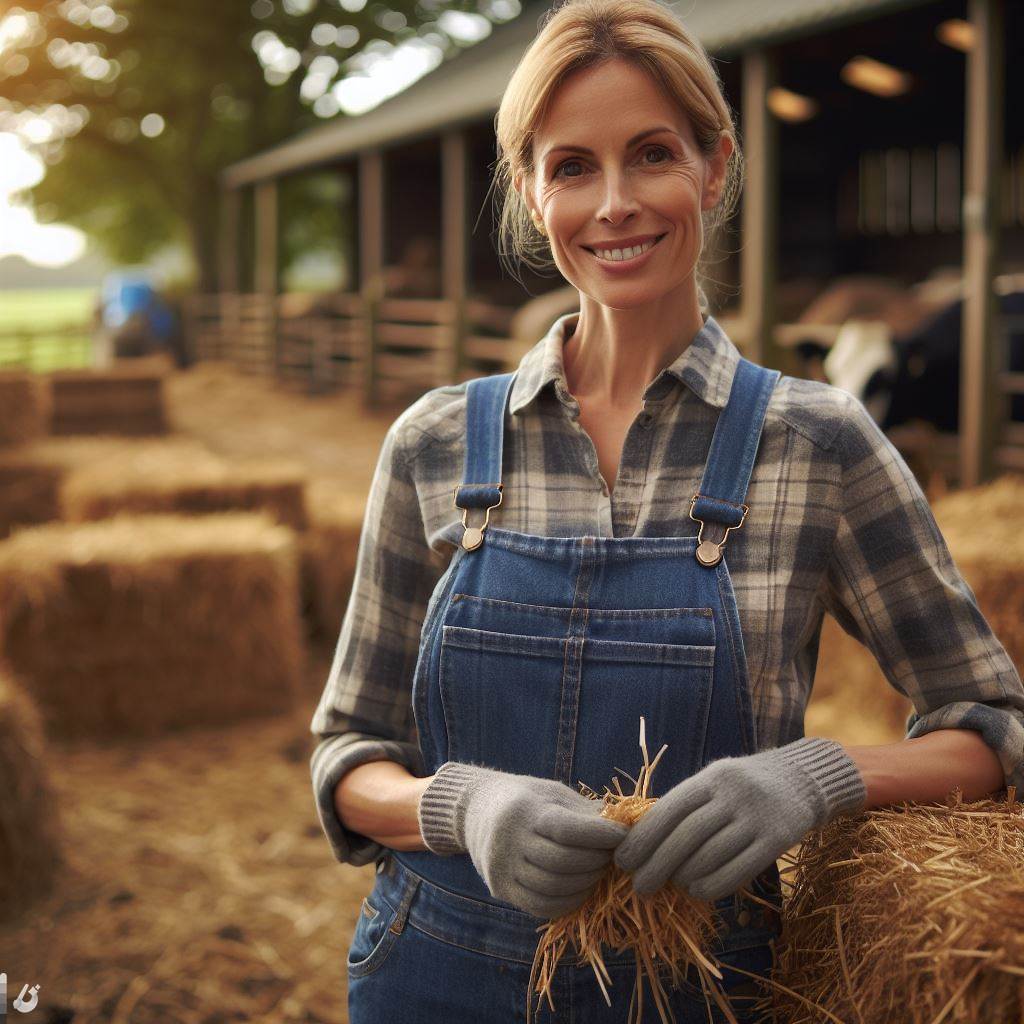Introduction
In the ever-evolving landscape of agriculture, technology stands as a pivotal force. The introduction unveils:
Importance of Technology in Agriculture
- Precision farming.
- Enhanced productivity.
- Sustainable practices.
Role of a UK Manager
- Integrating cutting-edge tech.
- Streamlining operations.
- Driving innovation in agricultural practices.
Unveiling the symbiotic bond between technology and agriculture, stressing the UK manager’s pivotal role in maximizing tools for efficiency, sustainability, and agricultural advancement.
Overview of Agriculture in the UK
Agriculture plays a significant role in the UK economy, contributing to its growth and development
- With a rich history in farming, agriculture has become an integral part of the country’s heritage.
- The sector provides employment opportunities for a significant number of people in rural areas.
- UK agriculture contributes to the nation’s food security and reduces dependency on imports.
- It also supports other industries such as food processing, manufacturing, and distribution.
However, farmers in the UK face numerous challenges in sustaining and growing their businesses
- Limited access to affordable land and high property prices make it difficult for new farmers to enter the industry.
- Climate change poses a major threat to agriculture, with unpredictable weather patterns affecting crop yields and livestock health.
- The rising costs of inputs like feed, fertilizers, and machinery put financial strain on farmers.
- Market volatility and fluctuating commodity prices make it challenging to plan for the future.
Given these challenges, there is a crucial need for technological advancements in the agricultural sector
- The adoption of digital tools and precision farming techniques can optimize resource allocation and improve productivity.
- Smart sensors and data analytics enable farmers to make informed decisions and prevent disease outbreaks.
- Drones and satellite imagery aid in monitoring crops, assessing soil health, and detecting pest infestations.
- Automated machinery and robotics reduce labor-intensive tasks, increasing efficiency and reducing costs.
Technological advancements in agriculture not only benefit farmers but also have wider implications
- Sustainable farming practices can help combat climate change, reduce greenhouse gas emissions, and preserve natural resources.
- Improved efficiency in agriculture can lead to better food quality, increased production, and reduced waste.
- Technological innovations attract investment in rural areas, stimulate economic growth, and promote rural development.
- Increased adoption of technology in agriculture can contribute to the overall competitiveness of the UK in the global market.
Most importantly, agriculture in the UK holds immense significance for the economy, employment, and food security.
However, farmers face various challenges that require modern solutions powered by technology.
Investing in technological advancements can not only address these challenges but also have broader benefits for society at large.
Read: Aquatic Health Management by UK Experts
Role of a UK Manager in Agriculture
A UK manager in the agriculture sector carries diverse responsibilities and duties to ensure efficient operations and increased productivity.
This role also involves integrating technology to boost overall efficiency and output.
Responsibilities and Duties
- Managing Farm Operations: The manager oversees all aspects of farm operations, including planting, cultivating, and harvesting crops.
- Supervising Livestock: They are responsible for managing livestock and ensuring their well-being, from breeding to health and nutrition.
- Implementing Agricultural Plans: Developing and implementing strategies to achieve agricultural objectives within budgetary constraints.
- Monitoring Resources: The manager tracks and monitors resources such as water, fertilizers, and pesticides, optimizing their usage for maximum yield.
- Maintaining Equipment: Ensuring proper maintenance of farm equipment to prevent breakdowns and disruptions in daily operations.
- Recruiting and Managing Staff: Hiring and managing a skilled workforce to handle various tasks efficiently and effectively.
- Complying with Regulations: Adhering to legal requirements, permits, and regulations related to farming and livestock management.
- Financial Management: Handling financial aspects of the farm, including budgeting, cost management, and profitability analysis.
- Market Research and Sales: Identifying market trends, conducting research, and implementing strategies for better product marketing and sales.
- Environmental Stewardship: Implementing eco-friendly farming practices and ensuring sustainability in agricultural activities.
Integrating Technology
A crucial aspect of a UK manager’s role in agriculture is integrating technology to achieve increased efficiency and productivity.
By leveraging the latest technological advancements, managers in the sector can streamline operations, reduce costs, and improve overall output.
Some ways in which technology can be integrated into agriculture management include:
- Farm Management Systems: Utilizing software applications and digital tools to monitor and manage various farm operations.
- Automated Machinery: Employing automated equipment such as precision agriculture tools and robots for planting, irrigation, and harvesting.
- Data Analysis: Using advanced analytics to analyze data collected from sensors and monitors, allowing for data-driven decision-making.
- Remote Monitoring: Harnessing remote sensing technologies to monitor crop health, pest infestations, and weather conditions.
- Smart Irrigation Systems: Installing intelligent irrigation systems that optimize water usage based on crop requirements and weather conditions.
- Traceability Solutions: Implementing technology to track and trace agricultural products from farm to table, ensuring quality and safety.
- Digital Marketing Platforms: Leveraging online platforms and social media channels to promote agricultural products and reach a wider audience.
- Precision Farming: Utilizing GPS and geospatial technologies to optimize field management, leading to higher crop yields and reduced resource wastage.
By embracing technology, UK managers can enhance their decision-making abilities, improve resource management, minimize environmental impact, and drive overall profitability in the agriculture sector.
Benefits of Technology in Agriculture
Modern agriculture, powered by cutting-edge technology, yields an array of advantages for UK managers. Embracing tech cultivates efficiency, driving higher yields.
Drones, with precision and speed, monitor crop health, ensuring optimal growth. Smart irrigation systems, responsive to weather forecasts, conserve water and boost sustainability.
Automated machinery slashes labor costs, streamlining operations and enhancing productivity.
Real-time data analytics empower managers to make informed decisions, adapting swiftly to changing conditions.
The Internet of Things (IoT) connects sensors, transforming farms into intelligent ecosystems. Mobile apps enable remote monitoring and control, empowering managers to stay in the loop.
With blockchain ensuring transparent supply chains, trust is built among stakeholders.
As agri-tech advances, UK managers equipped with this toolkit are at the forefront, reaping the rewards of a tech-driven agricultural revolution.
In essence, the adoption of technology in agriculture has brought transformative benefits to the sector.
From optimizing crop yield and reducing waste to enhancing efficiency and enabling remote farming, technology has redefined traditional farming practices.
By embracing these advancements, farmers can ensure sustainable and profitable agricultural operations while minimizing their environmental footprint.
Read: Aquatic Health Management by UK Experts
Key Technological Tools for UK Managers
In today’s modern world, technology plays a crucial role in every sector, including agriculture.
From farm management software to weather forecasting apps, there are numerous technological tools available that can greatly assist UK managers in optimizing their agricultural operations.
In this section, we will provide a comprehensive list of these tools and explain their specific applications in the agricultural context.
Farm Management Software
- Farm management software is a powerful tool that helps UK managers streamline their daily operations.
- It enables them to effectively manage tasks such as planning, budgeting, inventory tracking, and crop management.
- With the help of this software, managers can monitor and track farm activities in real-time, ensuring efficient resource allocation.
- Popular farm management software includes FarmLogs, Granular, and Agworld.
Weather Forecasting Apps
- Weather forecasting apps provide up-to-date weather information, enabling UK managers to make informed decisions.
- They offer detailed forecasts, including temperature, precipitation, wind speed, and humidity, helping managers plan irrigation and pesticide application.
- By staying abreast of weather conditions, managers can minimize crop damage, optimize irrigation schedules, and plan for potential weather-related challenges.
- Examples of popular weather forecasting apps include AccuWeather, The Weather Channel, and Weather Underground.
Soil Analysis Tools
- Soil analysis tools assist UK managers in understanding the characteristics and composition of their soil.
- These tools measure essential parameters like pH level, nutrient content, organic matter, and soil moisture.
- By analyzing the soil, managers can make informed decisions regarding fertilization, crop rotation, and soil amendments.
- Soil analysis tools include handheld devices like soil pH meters, moisture sensors, and advanced laboratory equipment for comprehensive testing.
Drones
- Drones have revolutionized precision agriculture by providing UK managers with aerial data and imagery.
- They can capture high-resolution images of fields, allowing managers to detect crop health issues, monitor growth patterns, and assess irrigation needs.
- With the help of drone technology, managers can identify problematic areas quickly and take corrective measures in a timely manner.
- Popular agricultural drones include DJI Agras series, PrecisionHawk Lancaster, and SenseFly eBee X.
Automated Irrigation Systems
- Automated irrigation systems are essential tools for UK managers to efficiently utilize water resources.
- These systems use sensors and weather data to determine the irrigation needs of crops.
- They can adjust watering schedules and volumes based on factors like soil moisture levels and weather forecasts.
- By implementing automated irrigation systems, managers can save water, reduce costs, and improve crop yield.
These are just a few examples of the technological tools available to UK managers in agriculture.
As technology continues to advance, more innovative tools are being developed to assist managers in optimizing their operations and improving overall productivity.
Embracing these technological advancements is crucial for the success and sustainability of the agricultural industry in the United Kingdom.
Personalized UK Career Consulting
Receive tailored career guidance designed just for you. Get actionable steps and expert support to boost your career in 1-3 days. Take control of your career now.
Get StartedRead: Aquatic Health Management by UK Experts

Challenges and Solutions for Implementing Technology
Challenges Faced by UK Managers
- Limited knowledge and understanding of new technologies in agriculture.
- Resistance to change among employees and farmers.
- High upfront costs associated with implementing new technology.
- Lack of access to reliable and affordable internet connectivity in rural areas.
- Data security and privacy concerns related to technology adoption.
Training and Education
UK managers should invest in comprehensive training programs to enhance their understanding of new agricultural technologies.
- Mandatory workshops and seminars to update knowledge and skills.
- Collaboration with technology providers to offer specialized training for employees.
Financial Incentives and Support
Financial support can encourage UK managers to overcome the hurdle of high upfront costs.
- Government subsidies and grants for technology adoption in agriculture.
- Partnerships with financial institutions to offer flexible payment options.
Improved Connectivity
Enhanced access to internet connectivity can facilitate the implementation of technology in agriculture.
- Investment in rural broadband infrastructure to ensure reliable and affordable internet access.
- Collaboration with telecommunication companies to extend coverage in remote areas.
Data Security and Privacy Measures
Addressing concerns related to data security and privacy is crucial for successful technology implementation.
- Strict adherence to data protection laws and regulations.
- Encryption and secure storage of sensitive information.
- Regular audits and assessments of security measures.
Benefits of Overcoming Challenges
Increased Efficiency and Productivity
Adopting technology in agriculture can streamline processes and improve overall efficiency and productivity.
- Automation of tasks reduces manual labor and minimizes errors.
- Data analytics enables informed decision-making for optimized resource allocation.
Improved Sustainability
Technological advancements contribute to sustainable practices in agriculture.
- Precise use of fertilizers and pesticides based on data analysis minimizes environmental impact.
- Efficient water management systems conserve resources.
Enhanced Quality and Yield
New technologies enable UK farmers to produce higher-quality crops and achieve greater yields.
- Monitoring systems ensure optimal growing conditions and early identification of any issues.
- Predictive analytics helps in risk management and improves crop outcomes.
Market Competitiveness
Adapting to technological advancements ensures that UK managers remain competitive in the agricultural sector.
- Access to real-time market data allows for agile decision-making and response to market trends.
- Improved product quality helps meet consumer demands.
Despite the challenges, UK managers can overcome obstacles in implementing technology in agriculture by leveraging training programs, financial incentives, improved connectivity, and data security measures.
By embracing the benefits of technology, they can enhance efficiency, sustainability, and competitiveness in the industry.
Read: Aquaculture Equipment Essentials in the UK
Case Studies: Successful Implementation of Technology in UK Agriculture
- John Smith: Increased crop yield by 20% using precision farming and data analysis. John Smith’s success story demonstrates the potential of precision farming and data analysis in enhancing crop productivity.
- Sarah Johnson: Utilized automated milking systems to streamline dairy operations, resulting in a 15% reduction in labor costs. Sarah Johnson’s adoption of automated milking systems revolutionized her dairy operations.
- James Wilson: Implemented drones for monitoring livestock, which reduced labor and improved animal welfare. James Wilson’s innovative use of drones revolutionized livestock monitoring.
- Emma Thompson: Adopted IoT sensors to monitor soil conditions, leading to optimized irrigation and water usage. Emma Thompson’s implementation of IoT sensors provided her with critical insights into soil conditions.
- Robert Davies: Integrated robotic technology in vegetable harvesting, reducing labor dependency and increasing productivity. Robert Davies embraced robotic technology to streamline vegetable harvesting. By utilizing automated systems, he reduced labor dependency and improved harvesting efficiency.
In summary, these case studies demonstrate the successful integration of technology in UK agriculture.
From precision farming and automated milking to drone monitoring and robotic harvesting, advancements in technology have enabled farmers to achieve improved outcomes and increased profitability.
The examples highlighted above serve as inspiration for other UK managers to embrace technology and realize its potential in transforming their agricultural practices.
Conclusion
UK managers must recognize the pivotal role technology plays in advancing agricultural practices.
Your Dream Job Starts with a Perfect CV
Get a tailored CV and cover letter that captures your unique strengths and stands out in your industry. Let us help you make an unforgettable first impression.
Get Started- Recap for Success: Technology isn’t just a tool; it’s the cornerstone of increased efficiency, productivity, and sustainability in agriculture.
- Future Farming Paradigm: Embrace technology not as an option but as a necessity to revolutionize the future of farming in the UK.
- Staying Ahead: To stay competitive, managers must remain vigilant, keeping abreast of the latest tech developments in agriculture.
In the dynamic landscape of UK agriculture, technology is the catalyst for growth and resilience.
It’s not just about adopting the latest gadget; it’s about steering the industry toward a future where innovation propels sustainability and success. Stay informed, stay ahead.
[E-Book for Sale]
500 Cutting-Edge Tech Startup Ideas for 2024 & 2025: Innovate, Create, Dominate
$19.99 • 500 Tech Startup Ideas • 62 pages
You will get inspired with 500 innovative tech startup ideas for 2024 and 2025, complete with concise descriptions to help you kickstart your entrepreneurial journey in AI, Blockchain, IoT, Fintech, and AR/VR.




